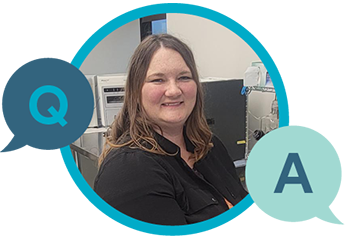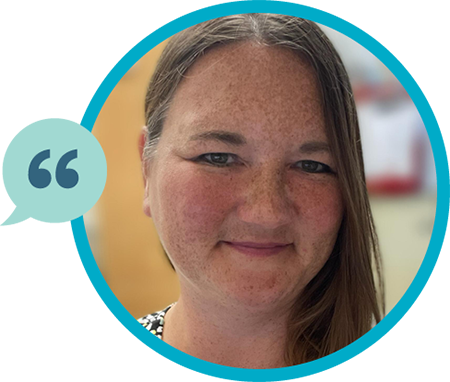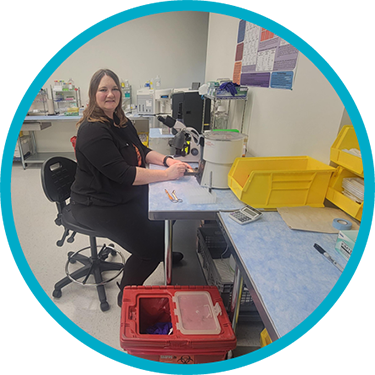
My name is Jennifer Chain, but I go by Jenny. I am originally from Amarillo, TX. I have been married for 18 years and I have two boys (ages 14 and 11) and a one-year-old boxer puppy at home. I began my career as a scientist 25 years ago in a research laboratory as an undergraduate student, then earned my PhD in immunology in 2005. After completing my research training in basic and clinical immunology, I worked in biotech, then as a R&D consultant through my own consulting firm.
I now work at Our Blood Institute (OBI, formerly “Oklahoma Blood Institute”) in Oklahoma City as the Director of Research and Development. I help to supply and develop new blood and cell-based products as well as manufacturing procedures for scientists and cell therapy companies to use in the research, development and the GMP manufacturing of therapies. Unexpectedly during my time at OBI, I have grown into a subject matter expert in the recruitment and stewardship of healthy donors for the collection of cell therapy starting material. I have also helped develop four new blood products to support the growth of cellular therapies and we have spun the manufacturing of those products into a company called CytoGrowth Solutions, where I serve as the Chief Scientific Officer.
I began my work with OBI in 2016 as a consultant to help develop testing, isolation, and manufacturing procedures for the blood center to use in support of the growing cellular therapy field. My boss, Charles Mooney, had a vision for community-based blood centers to be a central part of the supply chain and manufacturing model of biotherapies. As I moved into a permanent role at the blood center, I saw the field of biotherapy as an opportunity to apply my skills as a scientist and training in immunology to the development of products and services that will have a direct impact on the treatment of patients. I also saw endless opportunities to learn new things and contribute positively to a growing field.

In 2017, less than six months after joining OBI as a permanent employee, I was asked to help give a presentation at the AABB Annual Meeting in San Diego. During the Meeting, I also attended talks, asked questions, and met many new people in the blood and biotherapies field. I must have networked with the right people, because in 2018 I was asked to join the Cellular Therapies (CT) Standards Committee. I saw this as an opportunity to become more immersed in biotherapies. Soon after, I was elected to the CT Subsection Coordinating Committee. Since then, I’ve been a part of several additional AABB committees and have been able to give talks, present posters, chair sessions and lead discussion groups both during and in between Annual Meetings. Although I’ve only been a member of AABB for a short time, it has become an important part of my career and professional development. So far, I have had the wonderful opportunity to help shape the field of biotherapies through AABB organizational and committee membership.
I had been working in the blood center side of cellular therapies for five years at the time the CABP certification was first offered. I had learned a lot from the work I was doing at my organization and from my work on AABB committees. I had developed an expertise in biotherapies and felt that having the CABP credential was a way to support my claim of expertise and showcase it to help my organization grow its cellular therapy department. In growing and supporting our internal cell therapy department, OBI will be able to help more cellular therapy companies get what they need.

It is no secret that the field of biotherapies needs more skilled people at all levels - from development to manufacturing, quality and understanding regulations. The exam covers all essential aspects relevant to the field of biotherapies, so it defines the areas of mastery an expert in the field must obtain. The exam study syllabus provides an outline for the development of training programs and for individuals to focus on as they are working to become certified in the field of biotherapies. Those obtaining the CABP certification are helping to showcase their organization’s capabilities in these areas and have more opportunities for career advancement. If they decide to look for new positions, I think they will have preferred status compared with applicants who do not have a CABP certification. As more people obtain the CABP, organizations that supply products, develop therapies, manufacture therapies, and develop regulations will want to retain and hire professionals who have the expertise they need to be competitive in the field.
I think the biggest challenge in the field of biotherapies is a lack of trained individuals at all levels. I think this exam will help define the areas of mastery that an expert in the field must obtain and provide an outline for training programs that need to be developed specifically to train more professionals in biotherapy.
I think physicians who treat patients with biotherapies should consider taking the CABP exam, as well as scientists who are developing therapies. Laboratory, clinical and quality staff at organizations that develop, manufacture or treat patients with biotherapies should also consider taking this exam. Organizations that employ these groups of professionals could benefit from having experts that are knowledgeable about the totality of the lifecycle of biotherapies and the regulatory aspects that govern that lifecycle. Additionally, anyone who wants to take their career farther or in a different direction toward biotherapies should consider the exam as a career development tool.
I am a part of a spin-out company from our community blood center that is developing support products for the development and manufacture of biotherapies. I am excited to get those products to scientists who can use them in their work. I am also excited to see where this CABP credential takes my current organization. Will we develop a training program? Will we add more blood center personnel to the CABP awardees? Will we be able to further improve our products and services to cell and gene therapy companies? Will we be able to better help companies developing therapies because they trust our expertise a little more? I hope all of these are true and am excited to see how it all works out.


Becoming a CABP is a mark of distinction, establishing that qualified professionals have demonstrated – through a certification exam – that they have the necessary knowledge to credibly practice in the field of biotherapies.